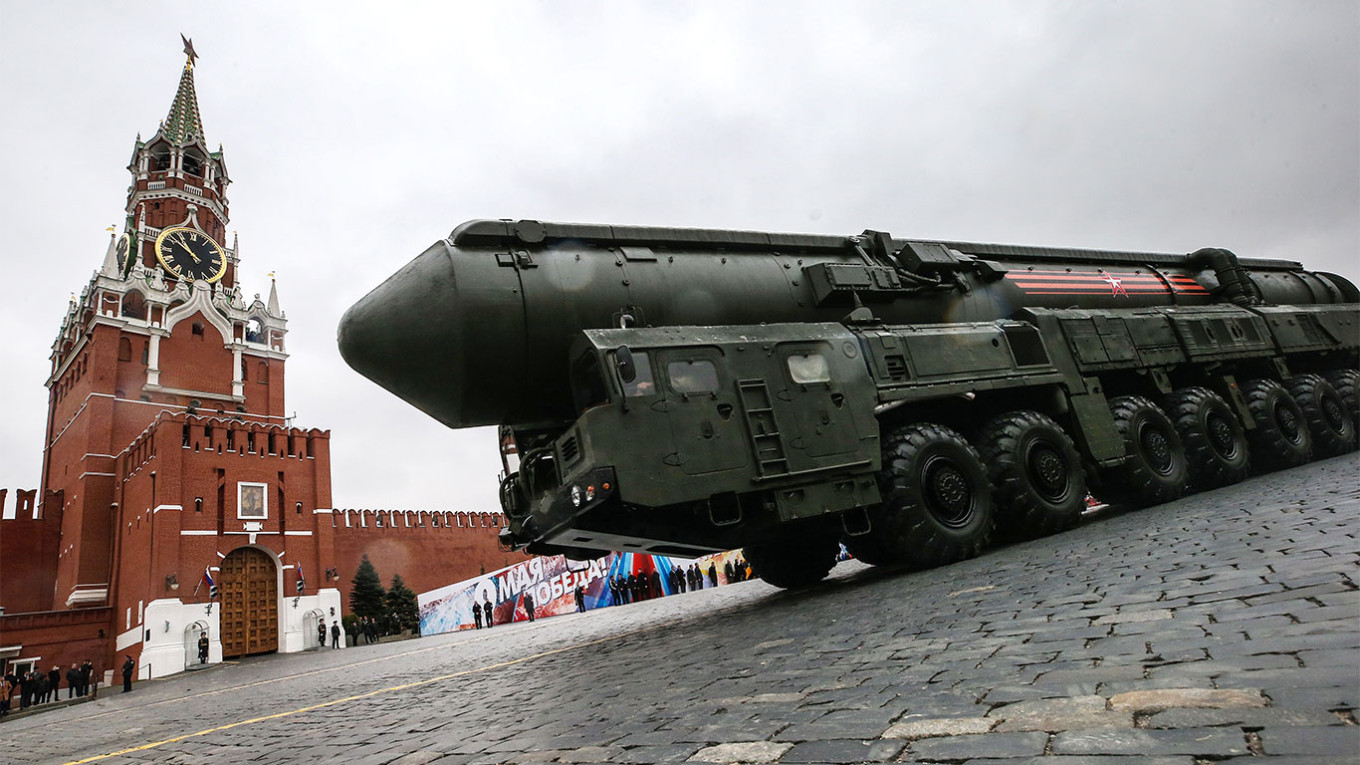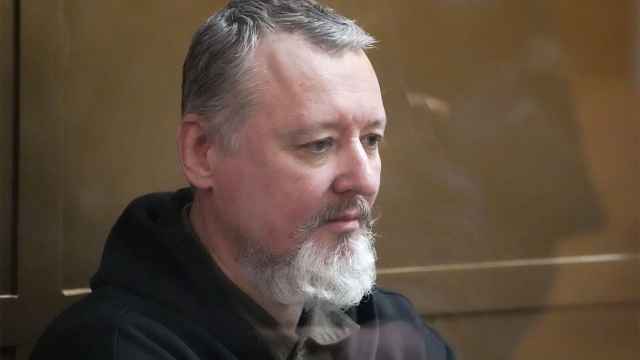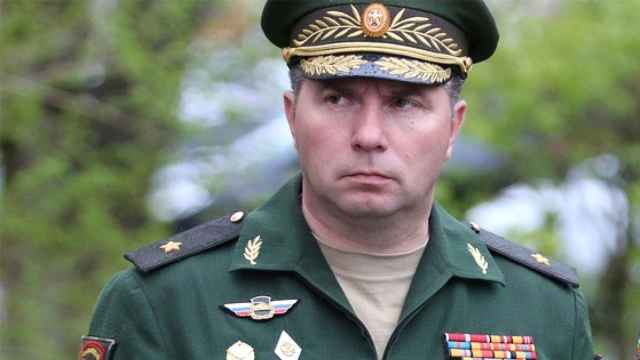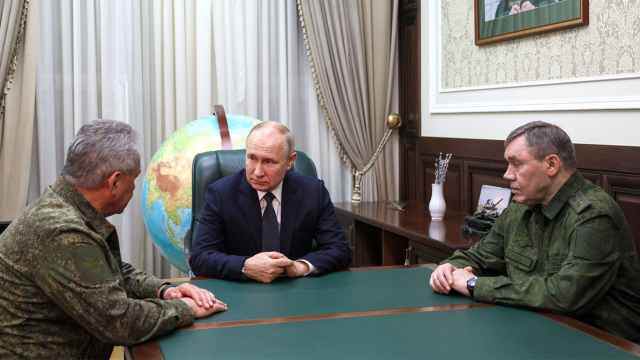Half a year into Russia’s full-scale invasion of Ukraine, the world was caught off-guard by President Vladimir Putin’s vow to use “all means” necessary to protect the territorial integrity of Russia – including the four newly illegally annexed Ukrainian regions and Crimea. These were, after all, the first explicit threats to use nuclear weapons from a major power since the end of the Cold War.
Moscow’s intention was clear: draw a red line and scare NATO out of supplying Kyiv with any weapons that could threaten Russia’s occupation and continued assault on Ukraine. Yet, the West doubled down and provided unprecedented amounts of heavy weaponry, ammunition, air defense systems, and training to Ukrainian troops. The Kremlin’s bluff was called, but Putin did not push the big red nuclear button.
Moscow’s threats have been all bark and no bite. Their ability to escalate is limited, and as a result they have forced themselves to rely on bellicose rhetoric. The West should recognize Russia’s threats as hollow and stand firm by continuing to deliver weapons and aid and moving toward security guarantees for Ukraine.
Firstly, military concerns and the internal threat of societal backlash like that seen after Russia’s 2022 partial mobilization are preventing the Kremlin from seriously retaliating against Ukraine or the West. Although Russia is not facing imminent defeat, it is occupied with Ukraine’s counteroffensive. With the majority of its military bogged down in defensive positions in eastern Ukraine after nearly 18 months of war, any consideration of opening an additional front in Ukraine, much less against another country or NATO member, is an absurd prospect.
While the frontlines remain relatively stable, Moscow will likely continue its war of attrition and make sporadic threats to project strength internally and externally – all while ignoring most of its mounting problems. Nuclear war is unlikely to be a serious consideration unless there is an existential threat to the Russian state, significant “Russian” territory or the regime’s survival. It is hard to see how Western arms supplies would meet this threshold.
Even assuming that Moscow does not opt for a nuclear response, Russia still lacks the capacity for real military escalation. What’s more, unless faced with wholesale defeat at the front rather than incremental setbacks, it is hard to see how it would be in Moscow’s interests: it could lead to uncontrollable escalation, a full-scale defeat or the end of Putin’s authoritarian system. A war with NATO, let alone a nuclear war, would be far too risky.
For Moscow to defend its red lines effectively in a conventional military sense, it would need to mobilize hundreds of thousands of additional men, which it is ill-prepared to do. With limited options to stimulate its highly sanctioned economy and growing discontent over the government’s handling of the war, a new wave of mobilization could lead to an even greater backlash than the one last year.
To preserve the fragile harmony within Russian society and maintain public support for the regime, the Kremlin must make every effort to avoid further mobilization and continue with its narrative that everything is going according to plan. That implies it will not follow through on its outlandish threats.
Furthermore, nuclear sabre-rattling from Russia’s political elite, such as former president and current deputy chairman of the Security Council Dmitry Medvedev, are so frequent that Western policymakers should take their significance with a grain of salt. Similar threats have emerged from nearly every corner of the elite, including Russia’s propaganda machinery. Margarita Simonyan, the head of the state-controlled broadcaster RT, has repeatedly exclaimed that a red line has been crossed and called for hellfire to rain down on Ukraine and the West – but to no avail.
The number of threats with no clear pattern is reminiscent of the Russian disinformation strategy of maskirovka: the use of deception, intimidation, and disinformation to bewilder the enemy. In recent years, political observers have recognized these tactics in Russia’s foreign policy, being used for election interference, hybrid warfare, and pro-Kremlin foreign-language propaganda. Regardless of the level of design around Russia’s chaotic information space, maskirovka has been a key strategy directed by the Kremlin at Kyiv and the West since the full-scale invasion last year.
Narratives in the Russian state-controlled information space are multi-layered, inconsistent, and often directed at producing and propagating so much disinformation that few know what to believe. If everything, including nuclear warfare, seems to be on the table, the situation becomes all the more terrifying and opaque. Watching Russia shell Ukrainian cities on a near-daily basis, it is understandable that the Western public could take Moscow’s threats seriously.
The consistency and quantity of Russia’s threats are intended to scare Western decision-makers and populations into making concessions. Threats directed at NATO countries have sparked small-scale pacifist demonstrations from Prague to London and New York to protest the alliance’s existence and call for an end to the fighting.
In some cases, the Kremlin itself may have been behind the protests. In France, Russian intelligence agencies were accused of having organized protests demanding an end to Western support for Ukraine. More famously, Russia has made serious efforts to co-opt Germany’s radical right and radical left parties, both of which oppose NATO as well as weapons deliveries to Ukraine. While this strategy has had some limited success in uniting Germany’s political fringes, for the most part, Ukrainian and Western politicians have held firm.
Finally, the sheer quantity of threats Russia has issued has led to a paradox in which the Kremlin is no longer able to succinctly define what its red lines are, and how it would respond. Kyiv has been emboldened, pushing the boundaries further than previously conceivable.
Since launching its invasion, Russia has threatened that it would not tolerate any incursions into its territory or attacks on its cities. After its illegal annexation of four Ukrainian regions in September 2022, Moscow made it clear that any attempts to retake them would be considered a red line. At various points, attacks on the Crimean bridge or weapons depots in Crimea have been red lines.
By the time Ukrainian drones were thought to have attacked the Kremlin itself in May 2023, Russia’s pro-war blogger community was complaining about the lack of real retaliation. They have been so frequent, there is now an entire Wikipedia page dedicated to Russia’s red lines and the lack of consequences when they were crossed.
The Kremlin’s habit of declaring practically everything a red line but never actually acting on violations of these boundaries has created ambiguity about what is acceptable and what is not. Indeed, its lack of response in most situations radically widens the scope for action. As Ukraine’s attacks grow bolder, the lack of a serious response only signals Moscow’s unwillingness or inability to counter them. Putin’s aloofness has exacerbated the situation, giving the impression that everything that happens is within the realm of what is acceptable.
The Kremlin’s responses are a far cry from its rhetoric of nuclear escalation. Without defined red lines delineating how far it will allow the West and Ukraine to go, and not acting when they have gone too far, the Kremlin has demonstrated weaknesses in its approach to deterrence. The West and NATO have no reason to slow down their arms deliveries.
Against this backdrop, Moscow’s threats to sink any vessel entering Ukraine’s territorial waters for the purpose of exporting its grain seem particularly empty. The Black Sea shipping route is a lifeline. Not just for Ukraine, which relies on its grain exports as a consequential source of revenue. But also for the rest of the world, as choking off Ukraine risks exacerbating global food scarcity and price hikes.
Here, Russia’s threats have been effective enough so far: it has put a stop to most of Ukraine’s Black Sea grain shipments with little response from the West. The world must understand that Russia is unlikely to escalate the war if transport vessels under NATO or EU protection cross the Black Sea.
With all of Russia’s threats, however, the proportionality is out of sync. Moscow is not going to risk global annihilation to prevent NATO from providing Kyiv with military aid, especially now that its defenses are (mostly) holding. It would not serve any strategic goal. Beyond the potential for catastrophic escalation, the use of nuclear weapons would also carry another risk: to Putin himself. Not only would this be seen highly unfavorably in Russia, but actors within the military or the Kremlin may challenge the president’s authority if ordered to carry out an escalation of that magnitude. Even in the Kremlin, Putin’s power has its limitations.
Russia’s red lines have repeatedly been proven to be hollow. While it is still faintly conceivable they might follow through, the Kremlin is unlikely to seriously do so if the West continues to deliver weapons to Ukraine. These red lines are purely a method of deterrence, and to believe them would be a mistake.
A Message from The Moscow Times:
Dear readers,
We are facing unprecedented challenges. Russia's Prosecutor General's Office has designated The Moscow Times as an "undesirable" organization, criminalizing our work and putting our staff at risk of prosecution. This follows our earlier unjust labeling as a "foreign agent."
These actions are direct attempts to silence independent journalism in Russia. The authorities claim our work "discredits the decisions of the Russian leadership." We see things differently: we strive to provide accurate, unbiased reporting on Russia.
We, the journalists of The Moscow Times, refuse to be silenced. But to continue our work, we need your help.
Your support, no matter how small, makes a world of difference. If you can, please support us monthly starting from just $2. It's quick to set up, and every contribution makes a significant impact.
By supporting The Moscow Times, you're defending open, independent journalism in the face of repression. Thank you for standing with us.
Remind me later.








